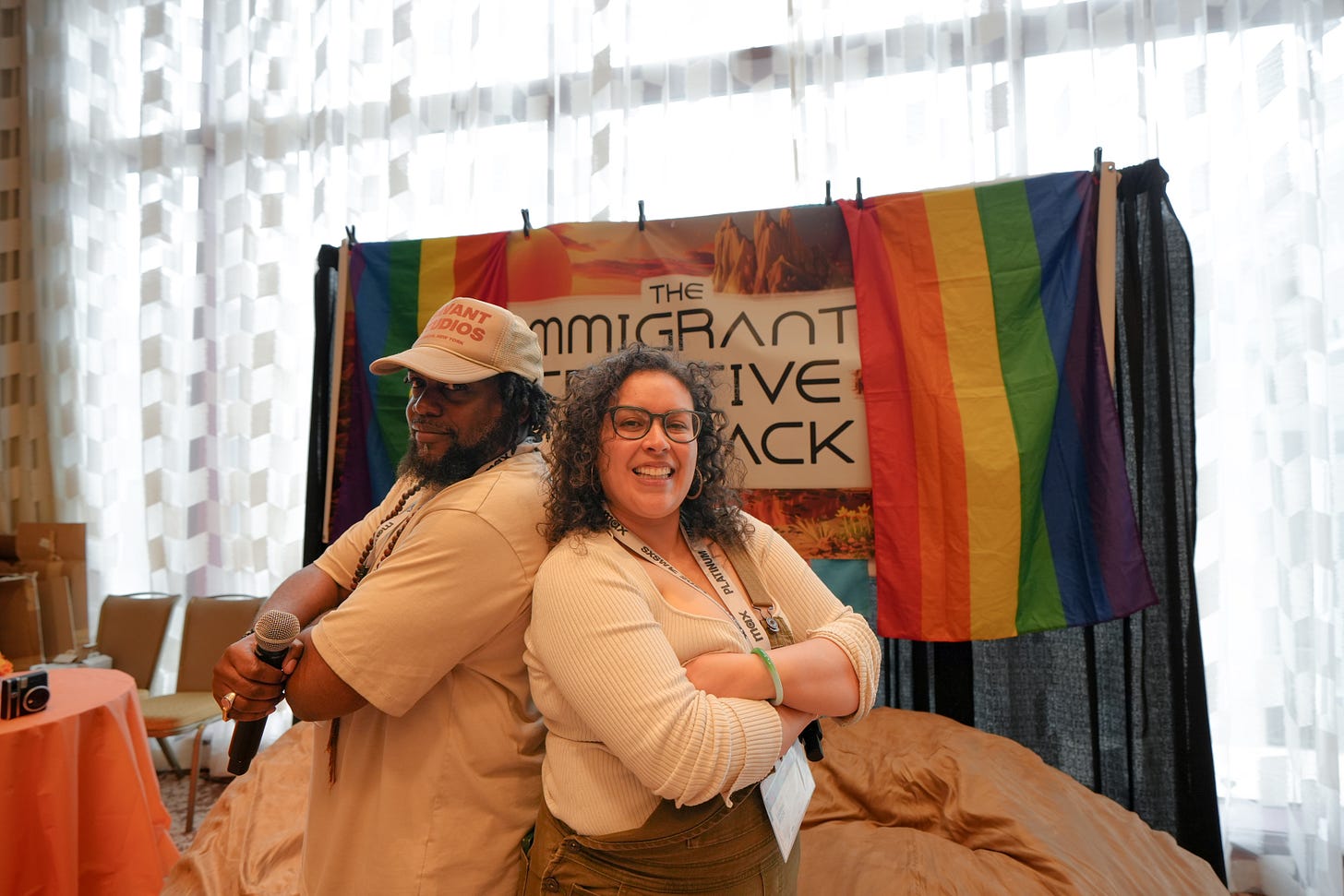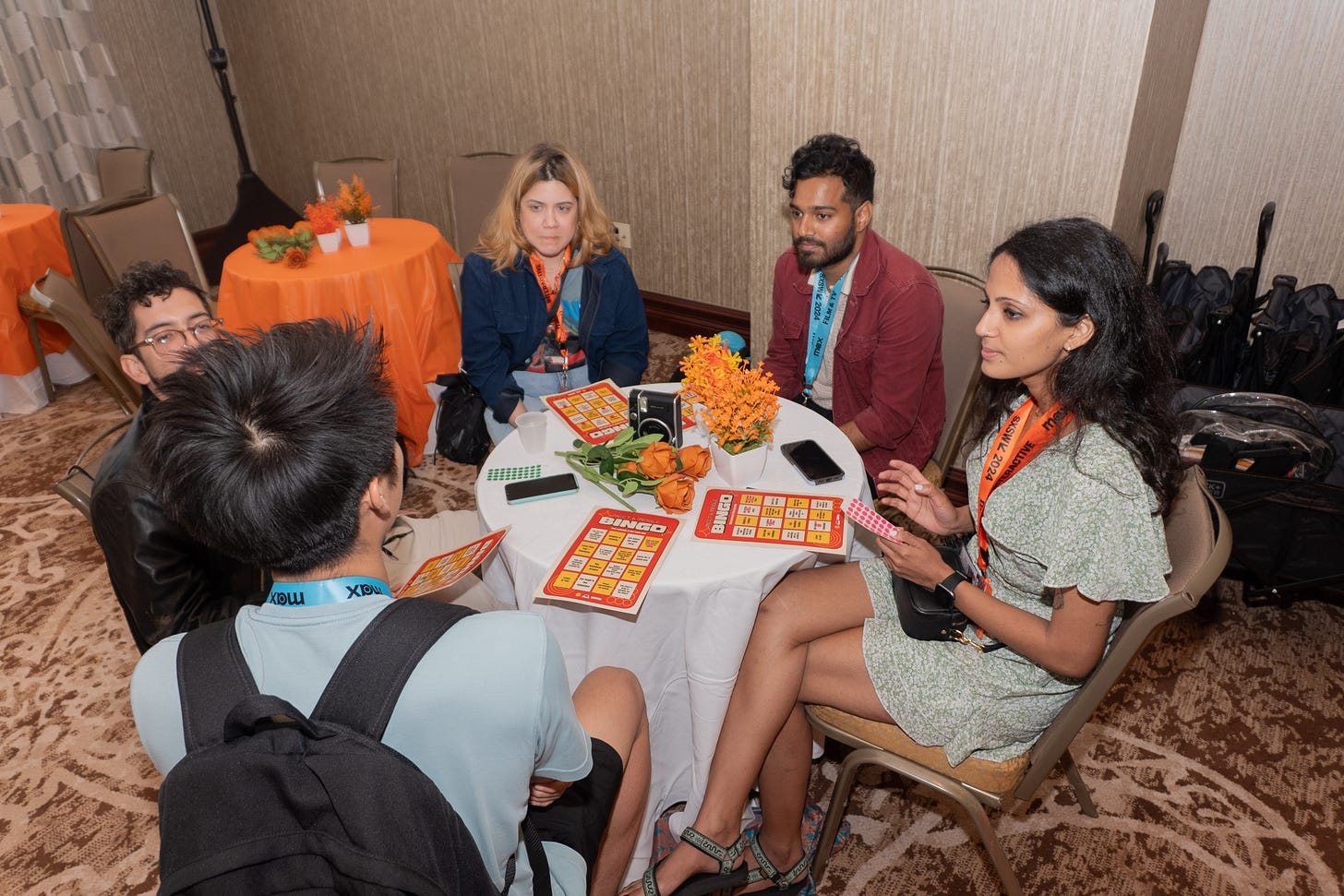“We need art more than ever to be able to create hope.”
United We Dream and Intelligent Mischief share strategies for sustaining creative work and collective care.
In this moment in which universities across this country are sites for liberatory resistance to global and local acts of State-driven violence, the need for creative action and expression has never felt more important. This week, we continue our conversation with Juanita Monsalve, Senior Marketing and Creative Director for United We Dream, and Terry Marshall, founder of Intelligent Mischief. Reflecting on their work co-creating the Immigrant Creative Kickback at this year’s South by Southwest Conference, Juanita and Terry’s conversation intentionally links creative production to activism and movements for the freedom of immigrants and individuals from all marginalized groups.
If you missed the first part of our conversation, you can catch up here.
ANTERO GARCIA: How do you see both of your organizations’ focus on abundance and collaboration as leading toward systemic social change?
JUANITA MONSALVE: I believe that long-term political change or policy change is not going to happen until cultural change happens. At least in the United States, the political world is a pendulum swing. So when the Democrats are in, X things happens. When the Republicans are in, X things happen. My intention in this work is to get to a place where people's values and culture are transformed and we can be clear on what is the vision that we share as a community, as a country. Culture change is really about that long-term vision, and it takes a long time for it to happen.
Culture change is also very much tied to narrative. Our beliefs are made up and based on the narratives that we believe, and those narratives then are made up of thousands of little stories that add up. With that in mind, we can have a thousand flowers bloom at the same time, which I think is the intention of the Kickback. If we want to change a narrative, then we need all of these different artists--all of these different creatives--to be creating with the intention of transformation. If we bring people together in this space and we allow them the freedom, the joy to see themselves as the change makers through their art, through their creativity, and infuse them with the values that we want to, that we believe will get us to this better future, then they can go and be the thousand flowers that bloom. Every single one of their projects would begin to contribute to this better future that we're trying to create.
AG: There’s a history of social movements tied to future-oriented storytelling.
JM: Learning from the movement for Black freedom, one of the things we’ve seen is that for many, many years now, Black people have come together and built a culture of what it means to be Black. It is that strength in identity and in culture that has allowed them to continue to fight for so long for freedom. My intention is to be able to create that for immigrant people, that we can come together and fight not only for immigrant freedom, but for the freedom of all people of color.
Abundance and collective care are about what our communities need in order to create a different world, a world in which we can all thrive and in which we can all be who we'd like to be. That's very much about fighting anti-immigrant narratives and disinformation.
If we ever want to get to a world where there is no ICE or police, then we need to discuss what it means to take care of and be committed to one another being in that collective care.
Abundance and collective care are about what our communities need in order to create a different world, a world in which we can all thrive and in which we can all be who we'd like to be.
AG: Terry, what would you add?
TERRY MARSHALL: It is all that! At Intelligent Mischief we talk about atmospheres of change, understanding that culture is our beliefs, our values, our assumptions, our behaviors that govern our society. We talk about culture in the way it becomes like the air that you breathe. Our cultural strategy is to create atmospheres of change. How can you change the air around folks so that the beliefs and behaviors that they deeply hold as a core value of themselves affects their behaviors and becomes the guiding principles we want in society?
Art is an expression of culture that becomes, then, a powerful tool for transforming people overall. That's why it is important, that cultural strategy, that's why it's important for immigrants and other marginalized people to have a say in their own life.
How can you change the air around folks so that the beliefs and behaviors that they deeply hold as a core value of themselves affects their behaviors and becomes the guiding principles we want in society?
AG: Building on a question we oftentimes ask here at La Cuenta, can you name some of the costs to individuals and society that we incur if we don’t develop spaces like the Immigrant Creative Kickback?
JM: That's an important question. It's making the argument for why I continue creating these spaces. When I think of South by Southwest, I think I've sat through panels on AI and as we have conversations about AI or about technology without thinking about the lived experience of those who are closest to the pain, then we are already far off from where we need to be. Often that makes us blind to the ways in which AI could have repercussions in those lives, or the way in which we're not training people on how to best use AI.
So, I think that there are places like South by Southwest where music and technology meet, but they can become sanitized when we don't have spaces for lived experience to be expressed and to be shared in community spaces. Creativity suffers because of that. And, in a place like Texas with what immigrant people are enduring now, we need art more than ever to be able to create hope, to be able to create a vision for a different future that gives us the strength to know what to fight for. There's a lot at stake, and so I don't think that we can disregard art or call it secondary to any of the parts of our fight at this time. I think we need it more than ever.
TM: The consequences of not having these voices is that people become invisibilized. If you're invisible, then you don't have power. If you're the one who's invisible or marginalized in a society, that's a sign you don't have power. It is easier to criminalize you. It's easier to murder folks. If your story and your voice is not visible, you don't even matter. You don't exist. Once you do that to a people, you could do wherever you want to them. You call human beings “illegal.”
The lack of voice, the lack of existing, and of having your own expression leaves you to be exploited and marginalized. And somebody else can write your story, which has life or death consequences.
AG: Given the success of this kickback, what’s next?
TM: Obviously, I think we've demonstrated the need for this type of space. I love the concept of the kickback. What's next is truly open because of where we are connecting with the people, seeing what collaborations come out of that. Even if we don't particularly do this space or the kickback again, the projects that we're planning for in the future are the core essence of this.
At Intelligent Mischief, we're working on a lot of projects around reparations and of a future narrative of reparations that is about abundance and care. We want to connect this work throughout the diaspora as well as in relationship to other folks that intersect with a focus on solidarity. So, this is the beginning.
JM: Definitely. Even as we were picking up these gigantic bean bags that then we're like, “Oh my God, why did we pick bringing these here?!” We were also like, “Maybe we should save these bean bags for when we shoot our podcast, the Immigrant Kickback …” And so I think both of our teams are really creative, and they already had a ton of ideas at the end. There's a lot of opportunity for the collaboration to continue between UWD and Intelligent Mischief. I think we definitely have ideas about how to continue to create interventions to ensure that immigrant voices are being heard. I think that the question is about making choices about which ones we want to move forward with.
Next year, the next season of No Words, Just Flavors, will be out as well. So that's something that we're working on here. For us, we want to create more opportunities like the Immigrant Creative Kickback for in-person lived experience and we want to continue to figure out how to do that in different spaces.
Propina
If you’re interested in learning about future events like the Immigrant Creative Kickback, keep an eye on posts from United We Dream and Intelligent Mischief.
If you are an individually currently or formerly labeled as undocumented and you’ve been active in recent on-campus demonstrations or organizing, we would love to hear your story. Please reach out.
We’ll see you next week.








